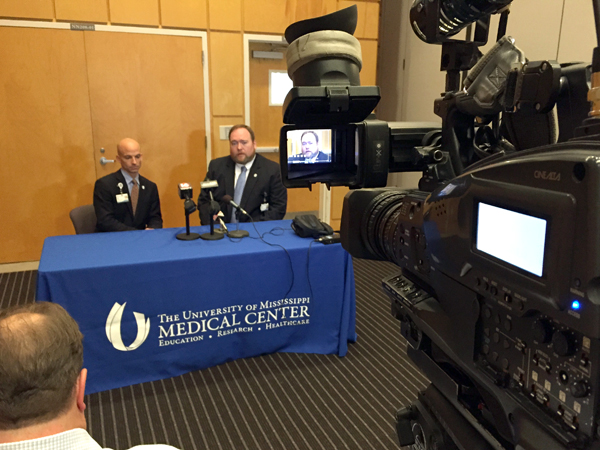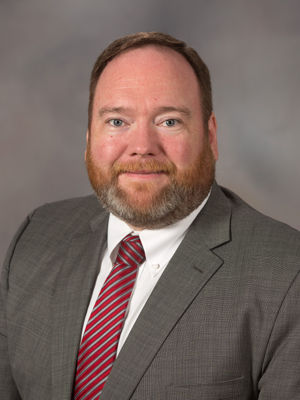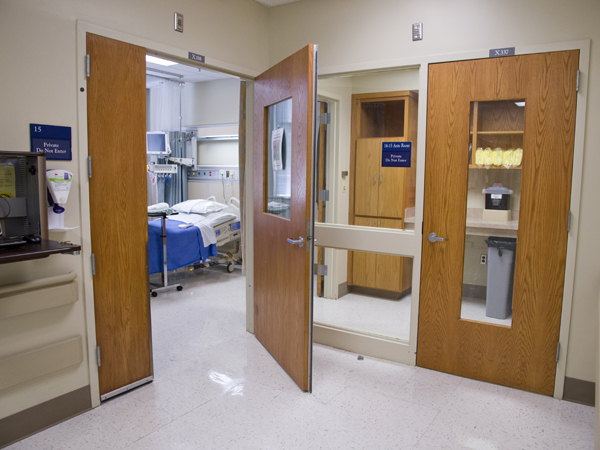Ebola at UMMC: risk low, readiness high

“We’re way ahead of the game,” Dr. James Keeton, vice chancellor for health affairs and dean of the School of Medicine, told clinical and support service managers gathered in the Student Union Tuesday for an informational session on the Ebola virus. It’s become epidemic in three West African countries, but resulted in just three diagnosed cases, one resulting in death, in this country.
“We’re here to give you a comfort zone, and to feel much better about what we are doing,” Keeton said.
UMMC is following the directives and guidance offered by the Atlanta-based Centers for Disease Control – protocol that is being regularly tweaked by the federal agency so that health-care workers and patients receive maximum protection from the disease’s transmission.
Dr. Alan Jones, UMMC’s chairman of the Department of Emergency Medicine, and Jonathan Wilson, chief administrative officer, outlined to employees the Medical Center’s priorities and procedures in the unlikely event that an Ebola case is confirmed here.

They’ve activated UMMC’s standing emergency response plan, which rolls out in the event of a natural or man-made disaster. “We’re looking at this from an operational perspective to see where we’re ready, and where we’re vulnerable,” Wilson said.
And as training and re-training continues for employees who would be front-line caregivers, he said, UMMC is as ready as it can be. Every step of the process “is being evaluated and analyzed,” Wilson said.
Health-care providers are being taught to rapidly assess patients with any Ebola-type symptoms, such as fever and nausea, by asking them if they’ve recently traveled to Liberia, Sierra Leone or Guinea, or if they’ve been in close proximity to someone who has traveled here from one of those countries and who has Ebola virus disease symptoms.
That protocol followed by the CDC and the Mississippi Department of Health works, as evidenced by several recent situations in which a patient at the ED with some of these viral symptoms has been found by staff to be extremely low risk for Ebola. “We haven’t had a true Ebola patient,” Wilson said.
But if a patient does meet qualifying factors for the disease, Wilson said, UMMC staff are trained to immediately isolate the person and greatly limit their contact with staff. Front-line health-care workers tending to a suspected or confirmed case of Ebola will wear personal protective equipment that not just meets, but surpasses CDC guidelines, Wilson said.
“We will have enough staff in those areas who are comfortable in the suit, and in taking off the suit,” he said of the single-use biohazard garb that would be used by a group of doctors and nurses selected for training. “We have a checklist of what we would do every time we put the suit on and take it off.”
Said Jones: “We know there’s no antidote or treatment for Ebola, so we would support the patient medically as best we can. To keep as many people and resources as safe as we can, we would need to isolate the patient and bring the resources to him until we know it’s (the diagnosis) credible.”
And that could mean bringing equipment, medical staff and specialized medical tents that can serve as isolation rooms to patients at small hospitals in Mississippi with more limited resources to take care of a patient. They’d be treated until decisions are made on who would ultimately give the person care, Jones said. UMMC has up to 15 treatment tents that can be deployed, Jones said.
“Bringing resources and manpower to a patient makes a lot more sense than moving them around,” he said.
Jones and Wilson said there are four facilities nationally that have specialized isolation units designed to contain biohazards such as Ebola : Emory University Hospital in Atlanta, Nebraska Medical Center in Omaha, the National Institutes of Health Clinical Center in Bethesda, Md., and St. Patrick Hospital in Missoula, Mt. The CDC seems to be leaning toward all Ebola patients in the country being treated at one of the four, Jones said.

But for now, he said, citing state Department of Health guidance, “every health-care facility in the state should be prepared to handle patients with Ebola. They don’t all have to come to UMMC. Multiple facilities in the Jackson area have had false cases of Ebola.”
Jones and Wilson also urge employees to get their flu shot as soon as possible. Unless they meet certain exemptions, all employees must get the immunization as a condition of their jobs. “Flu will kill 50,000 patients in the United States,” Jones said.
In short, they said, chances of UMMC treating a patient with confirmed Ebola are very low. But if it happens, the Medical Center has the resources and trained staff to handle it.
“Know that we have a plan, and that we are very confident that it can be carried out successfully,” Jones said.
Echoed Dr. Elham Ghonim, UMMC’s director of infection prevention: “We don’t know that much about Ebola, but we know enough about it to control it at UMMC. And, we have the perfect team to train for it.”
The Medical Center is “as prepared for this as we possibly could be,” said Kevin Cook, CEO of University Hospitals. “We are in a state of readiness to do what we need to do.”


